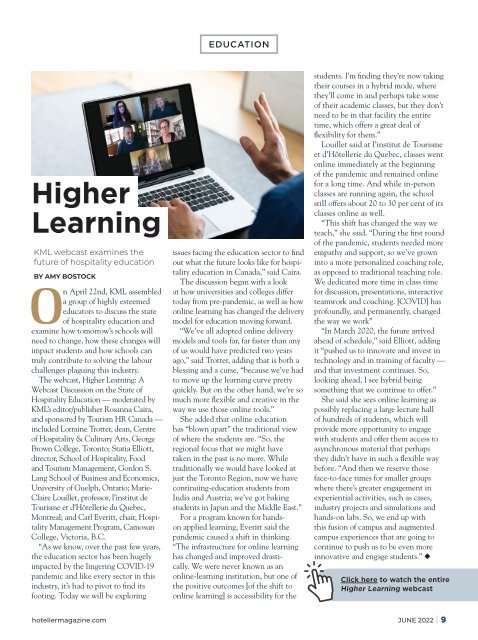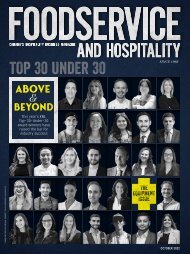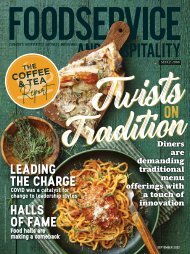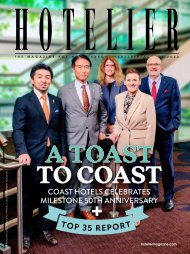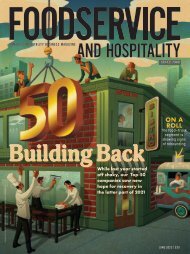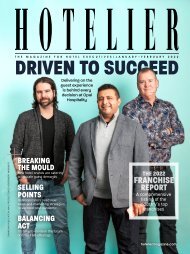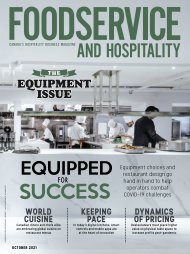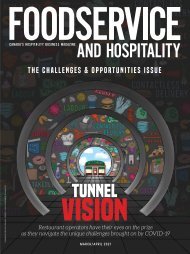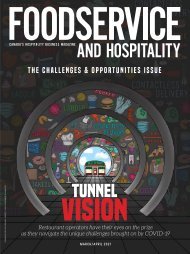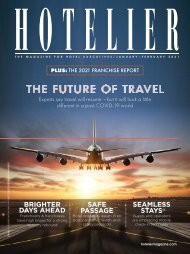Hotelier June 2022
Create successful ePaper yourself
Turn your PDF publications into a flip-book with our unique Google optimized e-Paper software.
EDUCATION<br />
Higher<br />
Learning<br />
KML webcast examines the<br />
future of hospitality education<br />
BY AMY BOSTOCK<br />
On April 22nd, KML assembled<br />
a group of highly esteemed<br />
educators to discuss the state<br />
of hospitality education and<br />
examine how tomorrow’s schools will<br />
need to change, how these changes will<br />
impact students and how schools can<br />
truly contribute to solving the labour<br />
challenges plaguing this industry.<br />
The webcast, Higher Learning: A<br />
Webcast Discussion on the State of<br />
Hospitality Education — moderated by<br />
KML’s editor/publisher Rosanna Caira,<br />
and sponsored by Tourism HR Canada —<br />
included Lorraine Trotter, dean, Centre<br />
of Hospitality & Culinary Arts, George<br />
Brown College, Toronto; Statia Elliott,<br />
director, School of Hospitality, Food<br />
and Tourism Management, Gordon S.<br />
Lang School of Business and Economics,<br />
University of Guelph, Ontario; Marie-<br />
Claire Louillet, professor, l’institut de<br />
Tourisme et d’Hôtellerie du Quebec,<br />
Montreal; and Carl Everitt, chair, Hospitality<br />
Management Program, Camosun<br />
College, Victoria, B.C.<br />
“As we know, over the past few years,<br />
the education sector has been hugely<br />
impacted by the lingering COVID-19<br />
pandemic and like every sector in this<br />
industry, it’s had to pivot to find its<br />
footing. Today we will be exploring<br />
issues facing the education sector to find<br />
out what the future looks like for hospitality<br />
education in Canada,” said Caira.<br />
The discussion began with a look<br />
at how universities and colleges differ<br />
today from pre-pandemic, as well as how<br />
online learning has changed the delivery<br />
model for education moving forward.<br />
“We’ve all adopted online delivery<br />
models and tools far, far faster than any<br />
of us would have predicted two years<br />
ago,” said Trotter, adding that is both a<br />
blessing and a curse, “because we’ve had<br />
to move up the learning curve pretty<br />
quickly. But on the other hand, we’re so<br />
much more flexible and creative in the<br />
way we use those online tools.”<br />
She added that online education<br />
has “blown apart” the traditional view<br />
of where the students are. “So, the<br />
regional focus that we might have<br />
taken in the past is no more. While<br />
traditionally we would have looked at<br />
just the Toronto Region, now we have<br />
continuing-education students from<br />
India and Austria; we’ve got baking<br />
students in Japan and the Middle East.”<br />
For a program known for handson<br />
applied learning, Everitt said the<br />
pandemic caused a shift in thinking.<br />
“The infrastructure for online learning<br />
has changed and improved drastically.<br />
We were never known as an<br />
online-learning institution, but one of<br />
the positive outcomes [of the shift to<br />
online learning] is accessibility for the<br />
students. I’m finding they’re now taking<br />
their courses in a hybrid mode, where<br />
they’ll come in and perhaps take some<br />
of their academic classes, but they don’t<br />
need to be in that facility the entire<br />
time, which offers a great deal of<br />
flexibility for them.”<br />
Louillet said at l’institut de Tourisme<br />
et d’Hôtellerie du Quebec, classes went<br />
online immediately at the beginning<br />
of the pandemic and remained online<br />
for a long time. And while in-person<br />
classes are running again, the school<br />
still offers about 20 to 30 per cent of its<br />
classes online as well.<br />
“This shift has changed the way we<br />
teach,” she said. “During the first round<br />
of the pandemic, students needed more<br />
empathy and support, so we’ve grown<br />
into a more personalized coaching role,<br />
as opposed to traditional teaching role.<br />
We dedicated more time in class time<br />
for discussion, presentations, interactive<br />
teamwork and coaching. [COVID] has<br />
profoundly, and permanently, changed<br />
the way we work”<br />
“In March 2020, the future arrived<br />
ahead of schedule,” said Elliott, adding<br />
it “pushed us to innovate and invest in<br />
technology and in training of faculty —<br />
and that investment continues. So,<br />
looking ahead, I see hybrid being<br />
something that we continue to offer.”<br />
She said she sees online learning as<br />
possibly replacing a large lecture hall<br />
of hundreds of students, which will<br />
provide more opportunity to engage<br />
with students and offer them access to<br />
asynchronous material that perhaps<br />
they didn’t have in such a flexible way<br />
before. “And then we reserve those<br />
face-to-face times for smaller groups<br />
where there’s greater engagement in<br />
experiential activities, such as cases,<br />
industry projects and simulations and<br />
hands-on labs. So, we end up with<br />
this fusion of campus and augmented<br />
campus experiences that are going to<br />
continue to push us to be even more<br />
innovative and engage students.” ◆<br />
Click here to watch the entire<br />
Higher Learning webcast<br />
hoteliermagazine.com JUNE <strong>2022</strong> | 9


